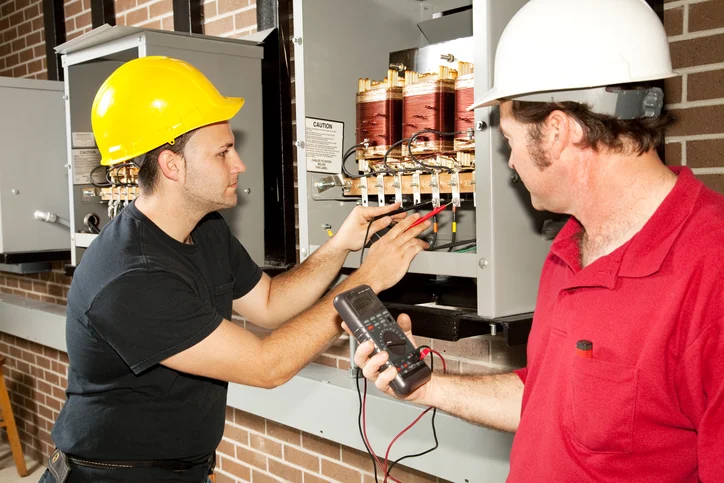What Is an Industrial Electrician and How to Become One

Table of Contents
- What Does an Industrial Electrician Do?
- How to Become an Industrial Electrician
- What Is the Difference Between an Industrial and Commercial Electrician?
- What Is the Work of an Industrial Electrician?
- How Long Does it Take to Become a Licensed Industrial Electrician?
- What Is the Difference Between Industrial Wiring and Residential Wiring?
- Industrial Electrician Job Description Sample
What Does an Industrial Electrician Do?
How to Become an Industrial Electrician
What Is the Difference Between an Industrial and Commercial Electrician?
The main difference between an industrial and commercial electrician is their work environment. A commercial electrician typically works in commercial buildings, like retail stores and restaurants ensuring that the wiring and electrical components are operating safely and efficiently. An industrial electrician, on the other hand, normally works in manufacturing plants and production facilities with complex, sensitive, and expensive machinery and electrical systems. Industrial electricians maintain a more extensive range of electrical systems, from micro-currents to high voltage components.
What Is the Work of an Industrial Electrician?
The primary work of an industrial electrician is the installation, repair, and maintenance of the electrical components in commercial buildings and industrial settings. Industrial electricians handle all types of electrical components, including wiring, conduits, circuit boards, outlets, lighting fixtures, and switches. When any of these electrical systems break down, industrial electricians must troubleshoot to solve and fix the problem.
How Long Does it Take to Become a Licensed Industrial Electrician?
It takes at least four years to become a licensed industrial electrician. An apprenticeship is the most common path to becoming a licensed journeyman industrial electrician. The apprenticeship typically includes about 144 hours of classroom instruction and 2,000 hours of on the job training per year. Some community colleges offer associate’s degrees and certificate programs which may count toward apprenticeship hours. When you complete the apprenticeship, you must pass a state exam on the National Electric Code to earn your license.
What Is the Difference Between Industrial Wiring and Residential Wiring?
The differences between industrial wiring and residential wiring are the insulation, voltage load, and installation process. Residential wiring is typically run through walls and attic crawl spaces in a single phase design, and it uses less voltage due to lower electrical load. Industrial wiring uses a three-phase design to create higher output to power high voltage equipment and multiple systems. Heavy-duty insulation protects industrial wiring from corrosive liquids or gasses. Sensitive and power-hungry machinery often require special, heavy-duty outlets.
Industrial Electrician Job Description Sample
With this Industrial Electrician job description sample, you can get a good idea of what employers are looking for when hiring for this position. Remember, every employer is different and each will have unique qualifications when they hire for a Industrial Electrician role.
Job Summary
Our company is looking for an experienced Industrial Electrician to join our team. In this role, you will be responsible for installing and programming electrical equipment. You will draw schematics to indicate where the wiring and components are installed, then measure, cut, and install wiring and conduit systems according to specifications. We use automation for some of our industrial processes, so you should feel comfortable interpreting PLC ladder logic programs. Other tasks in this role include performing preventative maintenance inspections and PFC tests. We prefer applicants that have an electrician journeyman license and several years of professional electrician experience.
Duties and Responsibilities
- Measure, cut, and install wiring and conduit systems
- Install and program electrical equipment
- Follow electrical blueprints and schematics
- Troubleshoot or replace electrical components as needed
- Perform preventative maintenance inspections
- Interpret PLC ladder logic programs
- Follow local, state, and national electric codes
- Maintain a clean and safe workplace
Requirements and Qualifications
- High school diploma or GED certificate
- Completion of a trade school or training program is a plus
- State journeyman license preferred
- Previous experience in an industrial environment strongly preferred
- Experience using hand tools
- Mechanical skills
- Physical ability